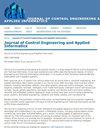基于改进积分滑模控制的MRAS的无传感器感应电机驱动
IF 0.6
4区 计算机科学
Q4 AUTOMATION & CONTROL SYSTEMS
引用次数: 0
摘要
为了提高无传感器转子磁链模型-参考-自适应系统(RF-MRAS)感应电机驱动(IMD)的性能,提出了一种改进的基于积分滑模控制的自适应算法(MISMCA)。在低速区域,由于传统的基于pi的自适应算法(PIA)和参数的不确定性,特别是转子时间常数的不确定性,使得RF-MRAS的性能不能得到保证。为了提高RF-MRAS的性能,PIA被基于积分滑模控制(ISMC)的算法所取代。在ISMC设计中,将包含转子时间常数的项视为噪声,采用基于参考模型的近似方法对转子时间常数进行自适应。此外,利用双极s型函数来减少颤振现象。通过无传感器RF-MRAS直接转矩控制IMD的仿真验证了MISMCA在估计速度误差的最大值和ITAE指标方面与PIA相比的优势。DOI: 10.61416 / ceai.v25i3.8563本文章由计算机程序翻译,如有差异,请以英文原文为准。
Sensorless Induction Motor Drive Using Modified Integral Sliding Mode Control-Based MRAS
A modified integral sliding mode control-based adaptation algorithm (MISMCA) is described to enhance performance of sensorless rotor flux model-reference-adaptive-system (RF-MRAS) induction motor drive (IMD). At low speed regions, performance of RF-MRAS is not guaranteed due to conventional PI-based adaptation algorithm (PIA) and parameter uncertainties, especially rotor time constant. In order to improve performance of RF-MRAS, the PIA is replaced by an algorithm based on integral sliding mode control (ISMC). In the ISMC design, the term that contains rotor time constant is considered as noise, and a reference model-based approximation is employed to adapt rotor time constant. Moreover, bipolar sigmoid function is utilized to reduce chattering-phenomenon. Simulations with sensorless RF-MRAS direct torque control IMD confirm the advantages of the MISMCA compared with the PIA in terms of maximum value and ITAE index of estimated speed error. DOI: 10.61416/ceai.v25i3.8563
求助全文
通过发布文献求助,成功后即可免费获取论文全文。
去求助
来源期刊
CiteScore
1.50
自引率
22.20%
发文量
0
审稿时长
6 months
期刊介绍:
The Journal is promoting theoretical and practical results in a large research field of Control Engineering and Technical Informatics. It has been published since 1999 under the Romanian Society of Control Engineering and Technical Informatics coordination, in its quality of IFAC Romanian National Member Organization and it appears quarterly.
Each issue has up to 12 papers from various areas such as control theory, computer engineering, and applied informatics. Basic topics included in our Journal since 1999 have been time-invariant control systems, including robustness, stability, time delay aspects; advanced control strategies, including adaptive, predictive, nonlinear, intelligent, multi-model techniques; intelligent control techniques such as fuzzy, neural, genetic algorithms, and expert systems; and discrete event and hybrid systems, networks and embedded systems. Application areas covered have been environmental engineering, power systems, biomedical engineering, industrial and mobile robotics, and manufacturing.

 求助内容:
求助内容: 应助结果提醒方式:
应助结果提醒方式:


